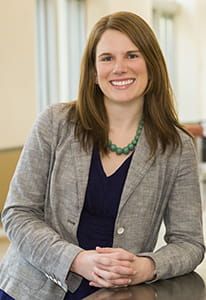
8/17/2023
PITTSBURGH — Patients with cancer who live in rural Pennsylvania counties appear to know that they may have better outcomes if they receive their cancer surgery at a hospital that performs a high volume of those surgeries, but still opt for lower volume hospitals closer to home when their cancer is likely less complex, according to a new analysis published today in JCO Oncology Practice by health policy scientists at the University of Pittsburgh School of Public Health.
With a shortage of experienced surgeons in rural America and rural hospital closures, providing appropriate surgical care to rural patients can be challenging. Programs and policies aim to centralize cancer services by steering surgical patients to high-volume hospitals, which are mostly located in urban areas. These policies have the potential to tie insurance reimbursements to quality metrics that include surgical volume. However, the study findings indicate it may be necessary to incorporate additional measures — such as the complexity and severity of the cancer, as well as patient quality of life and satisfaction — when setting policies that dictate where patients can and cannot receive cancer care. Doing so could encourage hospitals to continue offering such surgeries closer to home for rural patients when possible.
 “Our study suggests that narrowly focusing on hospital volumes and tying that to insurance reimbursement might mask complexities and trade-offs in achieving the goal of optimizing patient outcomes and experiences,” said senior author Lindsay Sabik, Ph.D., associate professor in Pitt Public Health’s Department of Health Policy and Management. “Not only are there cost and time burdens for rural patients who have to travel for care, but they are away from their local support networks, which can impact their quality of life.”
“Our study suggests that narrowly focusing on hospital volumes and tying that to insurance reimbursement might mask complexities and trade-offs in achieving the goal of optimizing patient outcomes and experiences,” said senior author Lindsay Sabik, Ph.D., associate professor in Pitt Public Health’s Department of Health Policy and Management. “Not only are there cost and time burdens for rural patients who have to travel for care, but they are away from their local support networks, which can impact their quality of life.”
Sabik and lead author Haleh Ramian, Ph.D., who conducted the study while a postdoctoral researcher at Pitt Public Health, obtained statewide data from the Pennsylvania Health Care Cost Containment Council on adult patients with a diagnosis of lung, pancreas, breast, brain, rectum, bladder, colon, esophagus, prostate or stomach cancer who underwent surgery between 2017 and 2020. They established whether each patient lived in one of the state’s 19 urban counties or 48 rural counties.
They then determined whether each of Pennsylvania’s 156 hospitals could be classified as “high-volume” depending on whether they fell into the top 10% to 30% for the number of surgeries performed for any given cancer type.
Rural patients with pancreatic or esophageal cancers — which typically require complex surgeries — were more likely than patients who live in urban counties to receive that surgery at a high-volume hospital. For brain and stomach cancer, the rates were nearly comparable between rural and urban patients. But for most of the other cancer types, which may entail less complex surgery, rural patients were less likely than their urban counterparts to receive cancer surgery at hospitals that perform a high volume of those surgeries, even though research shows that hospital volume is associated with improved outcomes.
Because high-volume hospitals are more likely to be located in metropolitan areas, it was not surprising to the researchers that patients living in rural areas were less likely to have their cancer surgeries at them than patients living in urban areas. But the fact that rural patients were traveling to high-volume hospitals for more complex cancer surgeries was telling.
 “To us, this indicates that patients are aware that they are more likely to have better outcomes at high-volume hospitals and they are seeking out those hospitals when their cancer is more complex,” said Ramian. “But when their cancer surgery is likely less complicated, they are weighing the risks with the convenience and support they have when receiving their surgery closer to home at a hospital that performs the surgery less often.”
“To us, this indicates that patients are aware that they are more likely to have better outcomes at high-volume hospitals and they are seeking out those hospitals when their cancer is more complex,” said Ramian. “But when their cancer surgery is likely less complicated, they are weighing the risks with the convenience and support they have when receiving their surgery closer to home at a hospital that performs the surgery less often.”
The researchers stressed that their study had several limitations, including that it could not account for cancer patients who may have chosen not to have surgery; only looked at hospital volume, not surgeon volume; and could not determine whether patients made different decisions about where to get cancer surgery depending on the severity, or stage, of their cancer.
“Future research should move beyond focusing primarily on the centralization of cancer surgery to improve outcomes and consider the consequences of centralization on quality of life and the continuum of cancer care including surgery as well as chemotherapy and radiation,” said Sabik, also director of the workgroup on cancer health services research at Pitt’s Health Policy Institute. “Identifying and executing strategies that could help make cancer surgery more equitable for underserved populations could counter disparities in cancer care for all.”
Additional authors on this study are Zhaojun Sun, Ph.D., Jonathan Yabes, Ph.D., and Bruce Jacobs, M.D., M.P.H., all of Pitt.
This research was supported by National Cancer Institute grant R01CA244189.
PHOTO DETAILS: (click images for high-res versions)
Top photo
CREDIT: University of Pittsburgh
CAPTION: Lindsay Sabik, Ph.D.
Bottom photo
CREDIT: Nicole Ober/University of Pittsburgh
CAPTION: Haleh Ramian, Ph.D.
















